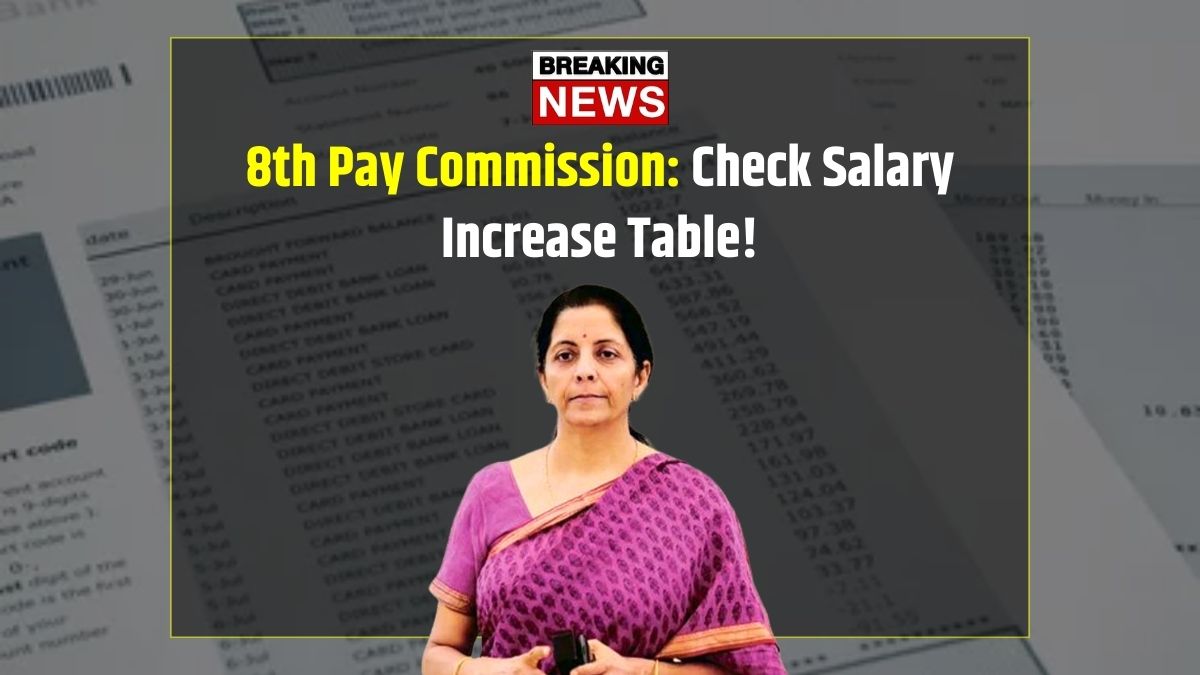8th Pay Commission – There’s some exciting news in the pipeline for central government employees. The buzz around the upcoming 8th Pay Commission is getting stronger, and if all goes according to plan, a major salary hike could be on the way. This could be a welcome relief for lakhs of employees and pensioners who’ve been dealing with rising costs and inflation for years now.
So what’s the latest update, when will it kick in, and how much of a boost are we really talking about? Let’s break it down.
When Can We Expect the 8th Pay Commission?
Let’s rewind a bit. The 7th Pay Commission came into effect back in January 2016. Usually, the government sets up a new pay commission every 10 years. Going by that trend, the 8th Pay Commission should be announced sometime in 2024 or 2025, and the new salaries would likely be implemented from January 2026.
Although there hasn’t been an official announcement yet, insiders say discussions are already happening behind the scenes. So, the groundwork seems to be in progress.
How Much of a Salary Hike Are We Talking About?
This is the part everyone’s interested in. According to early estimates by employee unions and financial experts, the basic pay could go up by 25 to 35 percent. That’s a pretty significant jump.
Keep in mind, the basic pay is the base amount from which other perks like HRA (house rent allowance), DA (dearness allowance), and TA (travel allowance) are calculated. So a higher basic pay means a better overall salary package.
If these predictions hold true, the 8th Pay Commission might bring one of the biggest pay hikes that government employees have seen in the last couple of decades.
What This Means for Employees
A hike in basic pay doesn’t just mean more money in your bank account—it can change a lot more. With the cost of living going up every year, especially in housing, education, and healthcare, this salary boost could help employees manage their finances better.
Pensioners are also expected to benefit. Thanks to policies like “One Rank One Pension,” any rise in pay scales usually means a rise in pension amounts too.
Plus, higher salaries tend to boost morale and job satisfaction. That could lead to better productivity across various departments.
The Bigger Picture: Impact on the Economy
It’s not just government employees who stand to gain. When millions of people suddenly have more money to spend, that’s bound to create a ripple effect across the economy.
Experts believe that the increase in disposable income will push up demand in sectors like real estate, automobiles, consumer goods, and retail. The private sector might also be nudged to increase salaries to stay competitive, especially in jobs where public and private roles overlap.
However, this kind of change isn’t without side effects. A sudden jump in demand can also trigger inflation in the short term. So, while the move could boost growth, it needs to be balanced carefully.
Will It Affect the Government’s Budget?
This is where things get tricky. Raising salaries for nearly 50 lakh employees and around 65 lakh pensioners means a huge financial commitment for the government. Some estimates say the added cost could run into several lakh crores over the next few years.
So, even though the salary hike is much needed, it also puts pressure on the government’s budget. Balancing employee benefits with financial discipline is going to be a big challenge. Policymakers will need to find new revenue streams and reduce unnecessary spending to make it work smoothly.
What Should Employees Expect?
Here’s a quick look at what might be coming your way if you’re a central government employee:
- A significant increase in basic pay
- Updated fitment factors and pay matrix to reflect current living costs
- Adjustments in allowances to make them more fair and efficient
- Possible performance-based incentives to modernize the pay structure
Employee unions are already actively lobbying for early implementation and better terms, so their input could shape the final recommendations.
All in all, the 8th Pay Commission is shaping up to be a big deal. For government employees and pensioners, it offers hope for better financial stability and a more balanced lifestyle. And for the economy, it could inject new energy into spending and growth.
Now, all eyes are on the Finance Ministry and top officials to make the official move. If things go according to plan, this could easily become the most important fiscal change of the decade.






